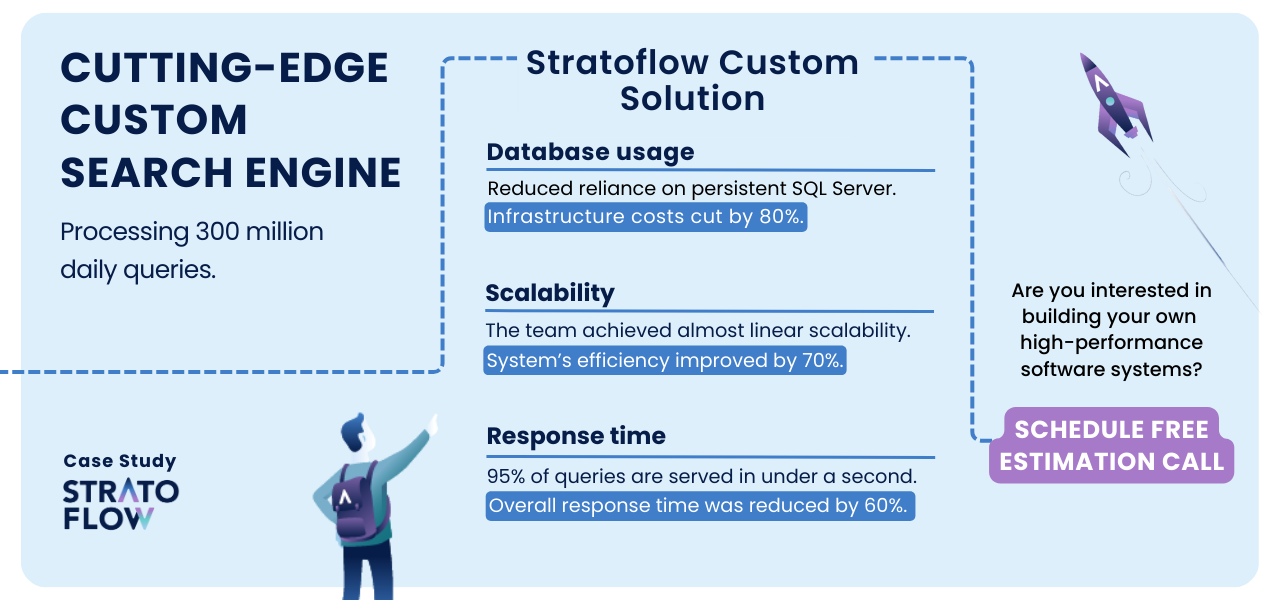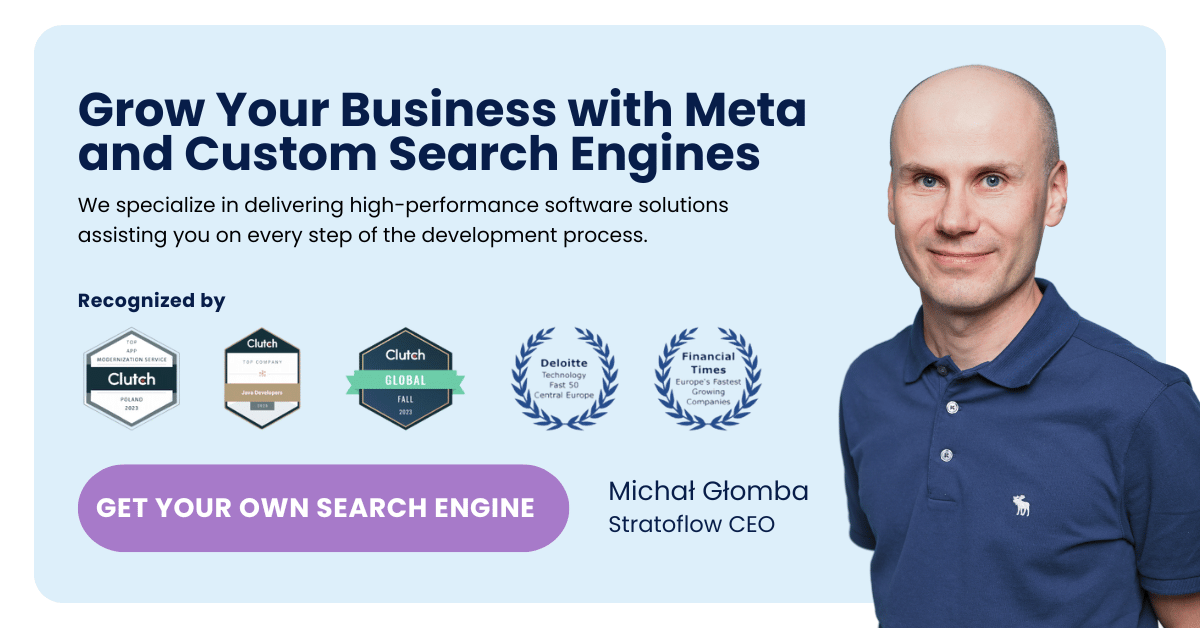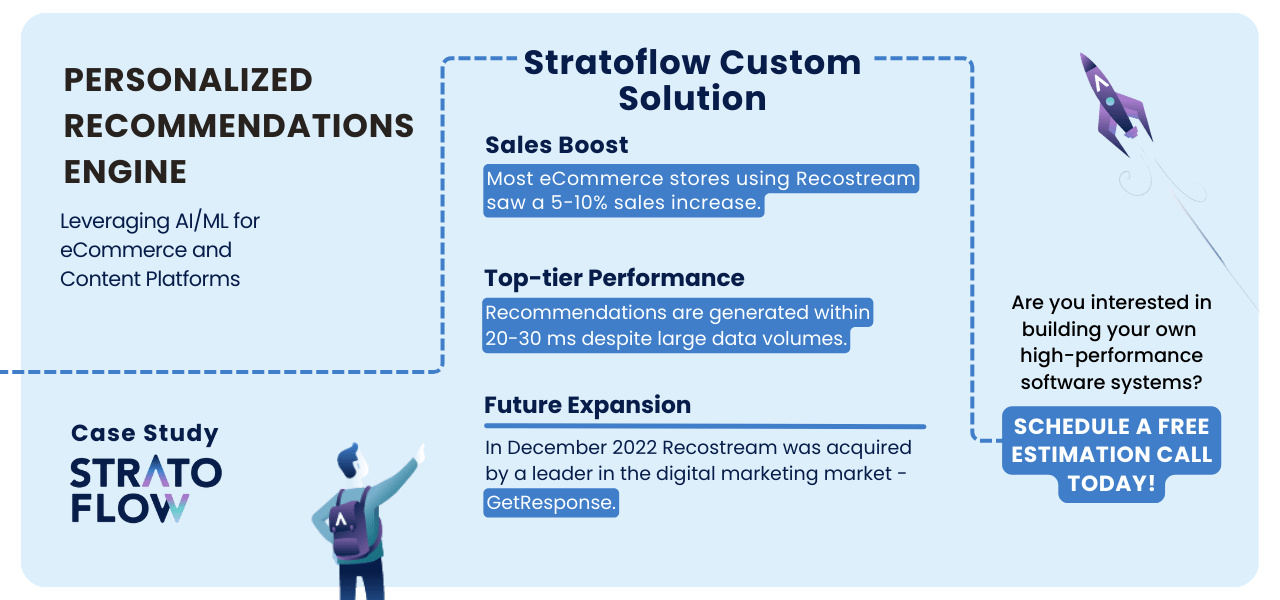
Creating Custom Search Engine for Your Website
A custom search engine enhances your site by delivering more relevant and personalized search results.
Unlike generic search engines, it allows you to tailor the search experience to the specific needs of your audience, improving user satisfaction and engagement.
This guide will show you how to create, customize, and optimize a custom search engine to meet your site’s unique requirements.
Creating the Best Custom Search Engine for Your Website
Creating a custom search engine for your site can significantly improve the user experience by delivering more relevant search results.
Unlike generic search engines, custom search engines allow you to tailor the search experience to your audience, ensuring that users find what they need quickly. This personalization focuses on the relevance of the content and the sources it uses.
Why Build Your Own Search Engine
More than just a navigation tool, a custom search engine is a critical part of your site’s user experience strategy.
In industries like ecommerce, travel, and real estate, the ability to provide accurate, fast, and personalized search results is a critical factor in driving user engagement and conversions. While off-the-shelf search solutions may seem convenient, they often lack the flexibility and scalability required to meet industry-specific needs.
When designed thoughtfully, a custom search engine delivers results tailored to your audience’s unique needs, making it easier for users to find the information they seek quickly and efficiently.
This level of personalization not only boosts user satisfaction but also fosters deeper engagement with your site.
Whether searching for web pages, images, or other resources, a well-designed custom search engine ensures a seamless and efficient search experience.
Customizing search results based on specific site content can greatly improve user satisfaction.
By defining which sites and domains your search engine prioritizes, you can ensure that users receive the most relevant information first. This targeted approach improves the user experience and increases the overall effectiveness of your site’s search functionality.
The foundation of a successful custom search engine is the technology it uses. Using the same search indexing technology as Google.com, the programmable search engine ensures fast and accurate search results.
This advanced technology provides users with the high-quality search experience they expect from leading search engines.
If you want to know more in details of how to build a custom search endine from the ground up check out our full in-depth guide: How to Build a Search Engine: Step by Step Guide
Building Custom Search Engine: Lessons from Previous Projects
Building a custom search engine is a complex task that requires careful planning, deep technical expertise, and a clear understanding of specific industry requirements.
It involves managing large data sets, ensuring fast and accurate search results, and integrating seamlessly with disparate systems.
Our team has a lot of experience in such projects.
One great example of our work is the custom search engine we developed for a leading travel company in the UK.
The objectives were simple:
- Build custom search functionality to travel company,
- Deliver search results is as short of a time as possible
- Design a system architecture that would be able to handle significant loads,
This system is designed to handle an 300 million queries per day, with more than 95% of those queries now being served in less than a second.
This was made possible by implementing an in-memory data grid system that enables real-time processing and ensures that users receive accurate and up-to-date information almost instantly.
Our team has also achieved significant performance improvements, reducing response times by 60%.
In addition, the search engine has nearly linear horizontal scalability, ensuring that it can scale efficiently as demand increases.
The in-memory processing architecture we implemented operates at approximately 70% efficiency, which is critical to maintaining high performance while managing such a large volume of data.
But travel industry is not the only field in which custom search engine is so important.
Our team can built custom search engines for a variety of industries, always tailoring our approach to the specific needs of the business.
Whether you’re in e-commerce, travel, or another industry, we have the expertise to develop a solution that meets your needs.
If you’re considering a custom search engine for your business, we’d love to hear from you. Let’s discuss how we can help bring your project to life with a solution that’s perfectly tailored to your needs.
Five Reasons to Choose a Custom Search Engine
Search functionality may seem like an afterthought, but in today’s digital landscape, businesses operating in competitive fields such as e-commerce, travel, and other specialized industries require more than just a generic search tool to meet their unique needs.
A custom search engine, built to meet the specific needs of your business, can provide significant benefits that off-the-shelf search solutions often fail to deliver.
Here are five key reasons why investing in a custom search engine could be a game-changer for your business:
- Enhanced Relevance and Precision: In both e-commerce and travel industries, custom search engines provide a more tailored search experience. For instance, in e-commerce, internal site search users are 2-3 times more likely to convert, with optimized site search leading to conversion rates up to 50% higher than average. Similarly, in the travel industry, AI-driven search functionalities help deliver personalized recommendations, with 60% of travel companies recognizing AI as crucial to their search strategy.
- Improved User Experience: Custom search engines significantly enhance user engagement. In e-commerce, approximately 43% of visitors head directly to the search bar, making it crucial for the search functionality to be efficient and intuitive. In the travel sector, 81% of travelers turn to search engines like Google for planning, and AI-enhanced tools provide a seamless booking experience, boosting satisfaction and loyalty.
- Brand Consistency and Control: With a custom search engine, businesses in both industries can maintain brand consistency and control. For example, metasearch engines in the travel industry account for over 45% of global unique visitors, offering a platform for hotels to maintain visibility and control over direct bookings.
- Actionable Insights and Analytics: Advanced analytics integrated into custom meta search engines allow businesses to optimize their offerings. E-commerce platforms benefit from features like dynamic pricing, which adjusts in real-time based on demand, helping to maximize profits.
- Scalability and Adaptability: As both the e-commerce and travel industries evolve, custom search engines offer the scalability to adapt. The integration of AI and predictive analytics in search tools is expected to continue transforming these industries, offering new ways to engage customers and stay competitive.
By implementing a custom search engine, businesses can not only enhance the user experience but also gain a competitive edge in their industry through greater precision, control, and actionable insights.
Personalizing Search Results
Modern custom search engines go a bit further than providing a simple search functionality.
These days users expect the sites they visit to actively anticipate what they are looking for.
That’s why, in 2025, personalizing search results will be critical to improving the user experience on your site.
Custom search engines allow site owners to personalize the search experience by selecting specific content sources and domains. This ensures that search results are relevant and tailored to the interests and needs of the audience, especially when launching a new search engine.
Here’s how to select the right domains and filter content to achieve this level of personalization.
Delivering Tailored Experiences
Personalization is not just about recommending products; it also involves adapting search results based on context, preferences, and intent.
In eCommerce, this could mean displaying complementary products or relevant bundles.
In travel, on the other hand, it might involve highlighting accommodations and activities that align with previous searches.
[Read also: How Can Your Business Make Use of Search Engine? Exploring Custom Solutions]
Filtering Content
Content filtering is critical to customizing your search engine to exclude irrelevant information.
Effective filtering mechanisms maintain the quality of search results and ensure that users receive only valuable information. This increases user satisfaction and builds trust in your search engine.
Users can customize search parameters and apply content filters to exclude unwanted results, keeping search results focused and relevant. This can be achieved by using structured data attributes and defined search operators to refine searches based on specific criteria.
Enhancing User Experience with Intelligent Features
And of course, how can we not mention AI – the next big step in taking personalization to a whole new level.
Intelligent features in custom search engines can greatly enhance user interactions by making the search process more intuitive and efficient.
Features such as auto-complete and intelligent type-ahead use AI and machine learning to predict user behavior and make suggestions in real time. These enhancements improve the accuracy of search results and make the search experience more user-friendly.
Here’s a closer look at these intelligent features and how they can change the way users interact with your search engine.
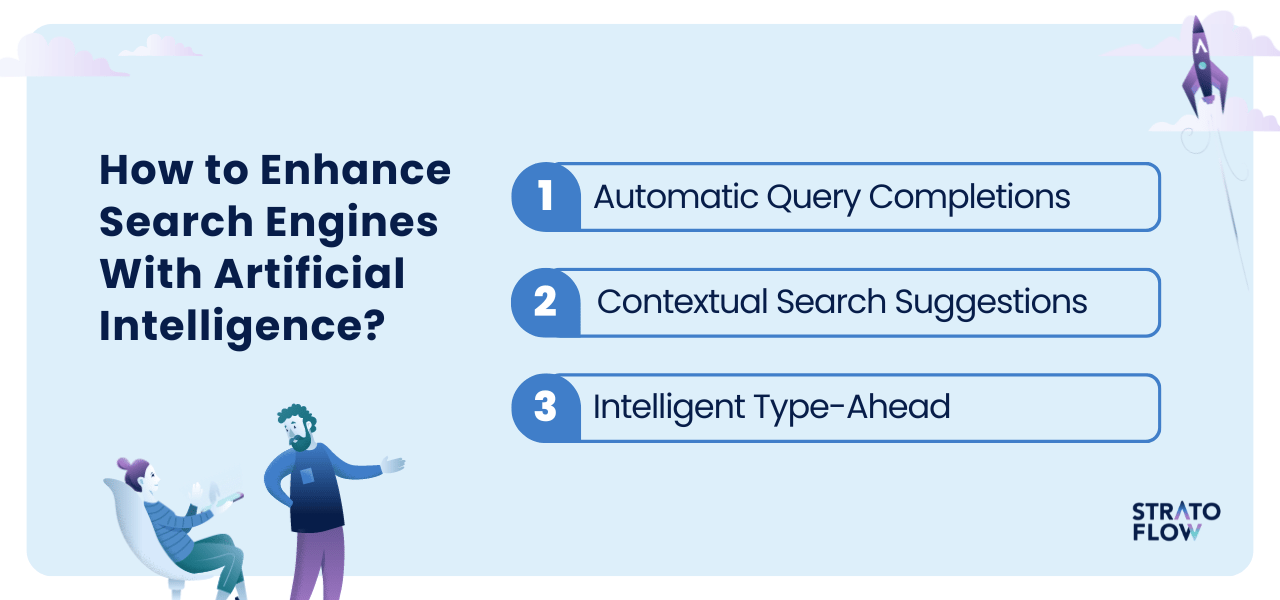
- Automatic Query Completions: Automatic query completions assist users by providing predefined options as they input text, improving search speed and efficiency. This feature reduces typing errors and helps users formulate queries more quickly by predicting their intended search. By suggesting phrases in real-time based on past user behavior, autocomplete functions can also boost conversion rates by guiding users to likely matches.
- Contextual Search Suggestions: Contextual search suggestions analyze the content of the user’s current query in conjunction with previous searches to provide highly relevant, context-based recommendations. This feature dynamically adapts to the specific intent of the user, offering more precise results that go beyond generic autocomplete options. By understanding the context of the search, these suggestions improve the accuracy of results, increase user satisfaction, and help users discover content or products they may not have initially considered, ultimately enhancing the overall search experience.
- Intelligent Type-Ahead: Intelligent type-ahead predicts user input and provides real-time suggestions to enhance the search process. By analyzing user behavior, this functionality offers dynamic and relevant suggestions as users type, improving search efficiency and user satisfaction. Implementing intelligent type-ahead results in a smoother search experience and higher chances of users finding relevant results quickly.
Incorporating intelligent type-ahead into your custom search engine makes the search process more intuitive and helps users find what they need with minimal effort.
At Stratoflow, we have extensive experience building personalization software that incorporates advanced data processing and analytics.
By analyzing user behavior, preferences, and historical interactions, our team’s solutions enable real-time, tailored recommendations and experiences.
One example is Recostream, an AI-driven recommendation engine that integrates with our systems to process large datasets, anticipate user interests, and provide relevant product or content suggestions.
Through this approach, organizations can deliver more personalized user interactions and potentially improve conversion rates, all while enhancing overall customer engagement.
Analyzing Search Data
A custom search engine is not only a tool for improving customer experiences but also a source of valuable business intelligence.
By analyzing search data, companies gain insights into user behavior, preferences, and trends.
Examining query volume, market distribution, and response code metrics provides valuable insight into user interactions and helps identify areas for improvement.
Here’s an in-depth look at these data analysis techniques to understand their impact on search engine optimization.
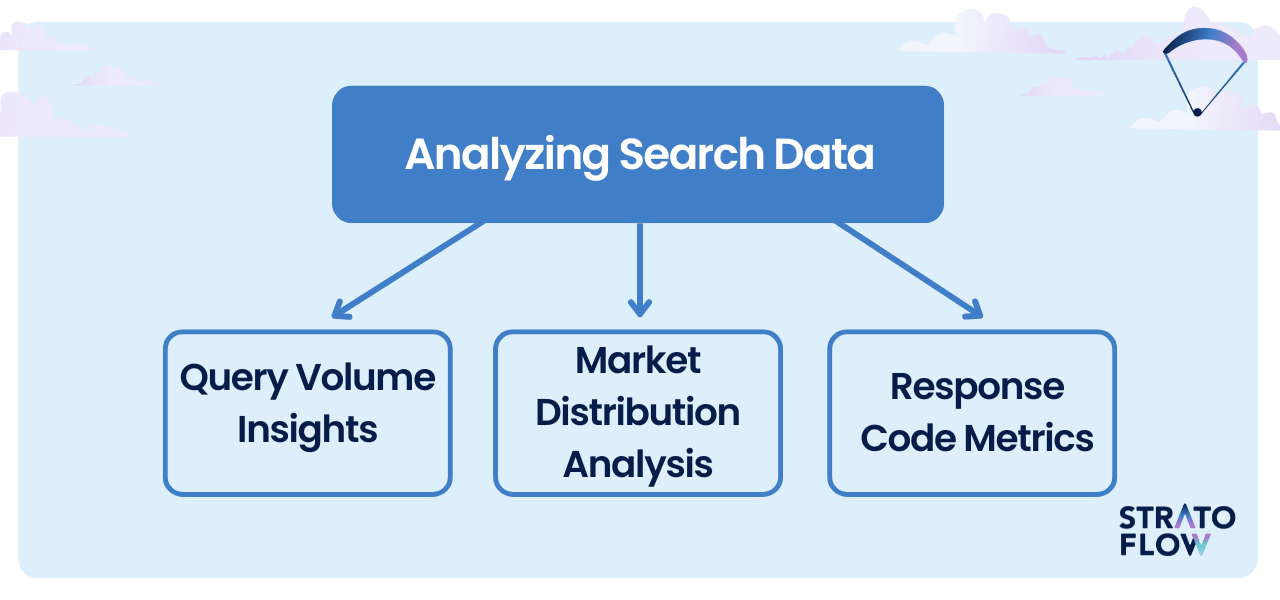
Query Volume Insights
Query volume insights reveal the frequency and types of queries users submit, indicating their interest and engagement levels. Tracking queries over time helps organizations understand trends in user interest and engagement. By analyzing these insights, businesses can make informed decisions based on user behavior and market dynamics.
Understanding search query volume is critical for businesses to gauge user interest and tailor their content strategies accordingly.
Market Distribution Analysis
Market distribution analysis shows how search queries are distributed across different demographics and geographies, informing targeted content strategies.
By identifying market segments, you can tailor search capabilities to meet the unique needs of specific user groups.
Analyzing query distribution can reveal trends such as peak search times and preferred search terms within a market segment.
With this insight, organizations can allocate resources appropriately and improve the user experience by focusing on areas of high demand.
Response Code Metrics
Evaluating HTTP response codes determines the health of a search service and highlights areas for improvement.
Monitoring response codes from search queries helps diagnose search performance issues and improve the user experience. This process identifies technical issues that affect search engine performance and ensures that users receive accurate and timely results.
Regularly evaluating response codes maintains the reliability and efficiency of your custom search engine.
[Read also: Hotel Metasearch Engines: Key Examples And Custom Solutions]
Summary
In summary, building a custom search engine involves several key steps, from initial setup and domain selection to filtering content and implementing intelligent features.
Personalizing and managing search results is critical to delivering a quality user experience. Analyzing search data on a regular basis ensures that your search engine remains effective and continues to meet user needs.
By following the guidelines and techniques discussed in this blog post, you can create a custom search engine that not only increases user satisfaction, but also drives engagement and retention. Harness the power of custom search engines to transform your site and provide users with the best possible search experience.
